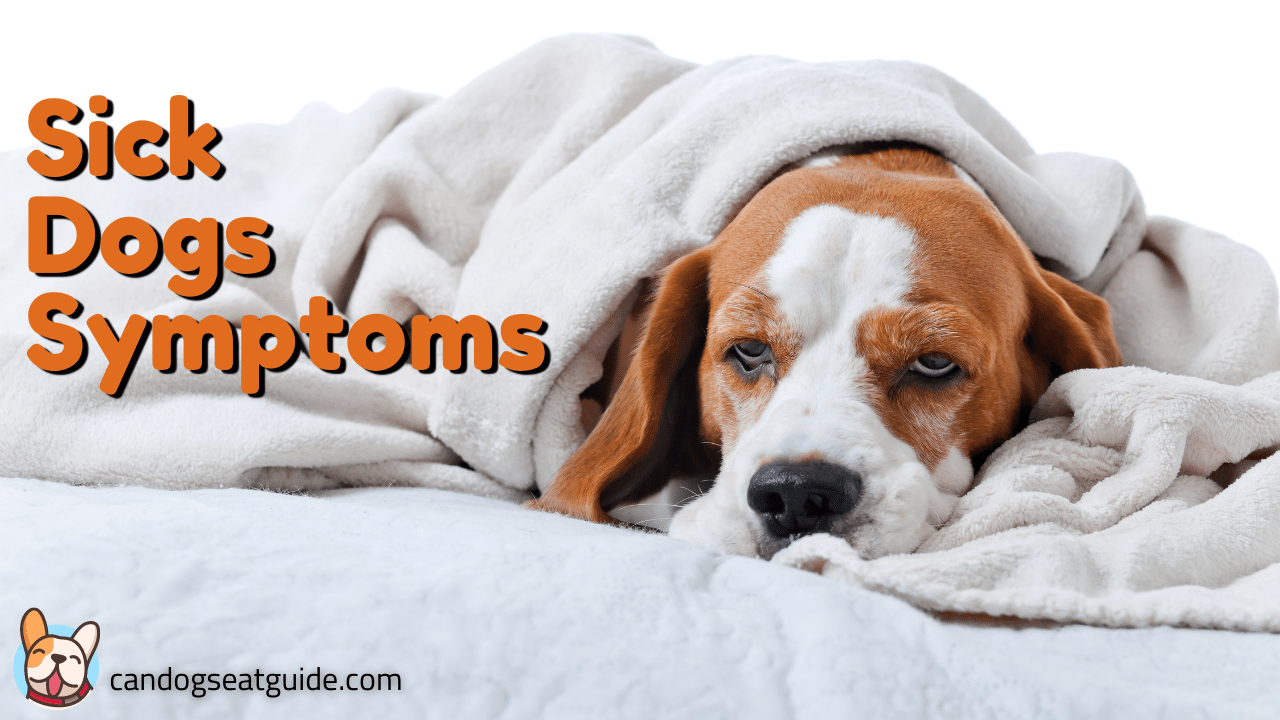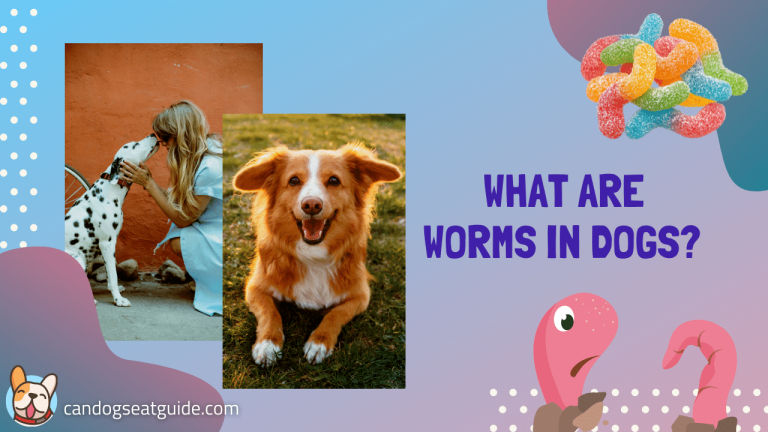“Is my dog sick?” is a question that unfortunately our dogs can’t answer.
It’s important to notice the change in your pooch when they get ill.
You must know that dogs don’t show any signs in the beginning when they get sick. They don’t want to show any weakness in front of us, that’s the animal instinct.
If you notice that something is out of order, immediately call your vet.
Sick dog symptoms can mean a mild cold but it can be an emergency case, too.
Sick Dog Symptoms
When I started my research on this topic, I thought there will be like 7-8 signs that will tell us when our dog is ill.
Well, I made a list of 20 symptoms and I got a bit worried.
But there is no place for worrying from your side.
Why?
I am going to explain every symptom and every detail you need to know.
But remember, always advise yourself to a vet when you notice anything strange.
I am going to separate all symptoms into 3 categories:
- emergency;
- severe; and,
- mild.
And let’s start.
Sick Dog Symptoms: Emergency Signs

If your dog has any of these signs, go to the nearest vet clinic or your vet as soon as you notice them:
- Collapse or loss of consciousness:
- potential reasons: electric shock, endocrine disease, diabetes, bites from insects, poisoning, or respiratory diseases.
- Unresponsiveness;
- Extremely bloated abdomen:
- stress, overeating, gastric dilatation-volvulus, peritonitis, Cushing’s syndrome, internal bleeding, and ascites.
- Severe wounds or bleeding;
- Seizures:
- epilepsy, liver disease, brain tumors, and toxins.
- Shaking and whining:
- old age, nausea, poisoning, pain, injury, seizures, etc.
- Bloody diarrhea:
- reasons can be poisoning, GI illnesses, parasite infections, cancer, kidney problems, liver disease, viral or bacterial infection, colitis, etc.
- Vomiting blood:
- it may be because of poisoning, gastric ulcers, kidney failure, liver failure, pancreatitis, GI illnesses, etc.
Sick Dog Symptoms: Severe Signs
1. Vomiting and Diarrhea
These two signs are the most common. But they don’t tell us much about why are they appearing. Like, these signs can mean absolutely everything.
We can start from food poisoning or just your dog had more food than usual, then it can mean that dog has worms, or maybe some digestive problems, or anything.
When your dog has diarrhea or vomits multiple times in a day, call your dog immediately.
If they had only once vomited or had diarrhea and you don’t notice anything else, your dogs act normal, then you can give them some rice and boiled chicken in small amounts. Rice is known to ease a dog’s tummy.
Boiled chicken is considered sick dog food.
If your dog is fine in the next 24 hours, then you can give them already dry food.
But if these symptoms occur multiple times, or your dog show signs of weakness, lack of appetite, and lethargy, then it’s time to call your vet.
2. Loss of Appetite
The loss of appetite can be a reason for some mild issues or serious diseases.
When your dog shows sudden loss of appetite and usually eats a lot, doesn’t want to eat even its favorite treats, it’s time for fast action. Consult with your vet if this condition lasts for more than a day.
You should be more worried if there are more symptoms like diarrhea, vomiting, pain, fever, and nausea.
3. Urination Accidents
When your dogs are well-trained where to pee, they will not suddenly start to urinate everywhere.
You should be aware of these signs:
- Decreased or Increased urination volume;
- Blood in urine;
- Straining to urinate.
Problems with urination may indicate an issue with the kidneys, or diabetes mellitus.
Bloody urination is usually a sign of urinary tract infection, bladder stones, or cancer.
If you can take a sample of the dog’s urine when you visit your vet so they can examine it.
4. Gain or Loss of Weight
Unfortunately, this sign takes a few weeks to be noticed. It needs urgent action as it’s a sign of a health issue.
If your dog gains weight rapidly it may be because of some diseases like:
- Cushing’s disease– an endocrine disorder;
- Diabetes;
- Thyroid disease;
If your dog is losing weight fast and has other symptoms like vomiting, diarrhea, or excessive urination, it may be a serious health problem. Problems can be diseases like anorexia, malabsorption, or maldigestion disorders.
5. Coughing and Difficulty in Breathing

These two sick dog symptoms are usually meaning respiratory problems.
Coughing and difficulty in breathing may occur if dogs have heart failure, too.
A dry, hacking cough may point to chronic bronchitis while a honking cough is a sign of collapsing trachea.
Kennel cough is used for many respiratory diseases in dogs such as canine distemper and canine influenza. Before going to your vet, call, and if they have any suspicion of kennel cough they will probably let you wait outside of the vet clinic because they don’t want other dogs to be infected, too.
For many dogs, kennel cough lasts 2 weeks, but it can rapidly progress to pneumonia for puppies.
6. Changes in the Drinking Habits
Drinking more or less water is a sign that your dog is ill.
If drink more water then it may mean that your pooch has a fever, kidney disease, or diabetes. You need to check if they are peeing more too or not.
If your dog is drinking less water then put more bowls with water around the home or give them chicken broth. This may help but it still may need a vet’s appointment.
7. Itchy skin or Losing hair
Itchy skin, loss of hair, and frequent scratching may be signs of problems like parasites, skin infections, allergies, or even alopecia. All these problems should be threatened until full recovery.
Examine the skin of your dog for redness, fleas, swelling, and pain. Mild symptoms of skin condition can be soothed by a bad, but you still need to connect with the vet.
The normal skin should be smooth and pink or black.
Things like home remedies or over-the-counter products for skin and hair rarely work. It’s better to seek help from a veterinarian. At least that will save you time.
8. Sleepiness, Lethargy, and Sleep Troubles
If you notice that your dog is lazier than usual, it’s a sign that your dog is sick.
Generally, dogs in pain will be less active than healthy dogs. A lethargic dog may have a viral infection, parasites, anemia, bacterial disease, etc.
Dogs may sleep more than usual but also have trouble with sleep like they are waking up very often.
But also dogs sleeping more than half a day, may have potentially diabetes, kidney disease, or heart disease.
9. Change in Behavior
When dogs don’t feel well or they are in pain, it’s usual to notice some changes in their behavior. They may get less active, or the typical social dog to get withdrawn. A kind dog may get aggressive.
Check if your dog gets aggressive when you are near some part of its body, the aggression may be a sign that the dog is in pain.
While some dogs may get aggressive, others may get more needy and clingy.
10. Pale Gums

Pale gums are a sign of anemia. Mild cases can be threatened at home by increased intake of iron, while severe cases may be life-threatening.
Get your vet to know immediately if there are signs accompanying pale gums.
Signs may be:
- very bad breath;
- sore and painful gums;
- bleeding gums;
- loose teeth;
- fever;
Pale gums are a sign of blood clotting disorders, shock, internal bleeding, or heart disease, too.
Sick Dog Symptoms: Mild Signs
1. Watering Eyes and Nasal Discharge
Another combination of sick dog symptoms is watering eyes and running nose are very common cold symptoms.
Some dogs can stay at home and you take care of them, but some dogs need vet appointments and special medicine.
The cold symptoms will go on for 5-10 days.
2. Stiffness and Difficulty Rising
Experiencing difficulty in walking is a normal thing for old dogs.
But it isn’t normal for dogs that were active a few days ago. Decrease their activity for a day and see how they will be on the next day.
If this problem continues, seek medical help.
This may be a sign of arthritis, joint problems, or infections.
3. Eye Changes

Runny eyes aren’t always a sign of a cold.
In addition to runny eyes, they may get red, or the dog may be holding them close. These can be mild symptoms but also can be ulceration or glaucoma.
They also may be cloudy or have developed a secretion of fluids in the eyes.
You should keep your dog’s paws away from the eyes because scratching and rubbing can cause severe damage. Call your vet for an appointment.
4. Bad Breath
Bad breath can be caused because of:
- Dental or gum disease;
- Foreign body stuck in your dog’s mouth;
- Diabetes;
- Liver disease;
- Kidney disease;
- Toxicity;
- Oral tumor;
- Dietary deficiency.
Medical Treatment
It’s best to seek medical help when you feel that something is wrong with your dog. You know them better than anyone else.
Don’t wait to see how your dog will feel after a few hours because it may lead to some serious problems.
1. Meloxicam
Meloxicam is used to relieve pain, recover dogs from fever, cure inflammation, and act as a treatment for osteoarthritis. It is helpful for muscle and bone disorders.
It works by reducing the hormones in the body that can cause pain and inflammation. Meloxicam is FDA approved non-steroidal, anti-inflammatory drug (NSAID) that needs a prescription from the vet.
Dosage:
Normally, the recommended dosage for dogs is 0.09 to 0.1 mg per pound on the first day of treatment.
If the dog doesn’t show any side effects and in fact gets better, then for the next few days, it can go up followed by 0.045 to 0.05 mg per pound once a day.
Dosage precautions:
- Meloxicam should not be given to dogs that are hypersensitive to NSAIDs.
- Not given to dogs less than 6 weeks of age.
- Pregnant, lactating, or breeding dogs shall be avoided the Meloxicam dose as it has not been sufficiently tested.
- Dogs with bleeding disorders.
2. Pepto Bismol

Pepto Bismol is a human medicine that can be used for dogs with minor stomach issues. It is sold without a prescription but you should consult a vet before giving it to your doggo.
If your dog is suffering from chronic upset stomach Pepto maybe won’t help it.
Dosage precautions:
- If your dog is allergic to one or more of the active ingredients.
- Pregnant or nursing dogs should not take Pepto.
- The dog has several canine bleeding disorders.
Side effects are rare and usually mild. The most common side effects are constipation, oddly colored stools (grey, black, or green), or a darkened tongue.
6 Foods For Sick Dogs
Although it’s a difficult task to feed a dog that doesn’t have an appetite or has an upset stomach, we should still do it so our doggo can feel better soon.
Food shouldn’t be too heavy but still needs to have the needed nutrition dogs need to recover.
But of course, you should always check first your vet and don’t start treatment on your own.
These foods are suitable for dogs with mild symptoms, but for emergency or severe symptoms, they won’t help.
1. Chicken and Rice
Both chicken and rice are the prime ingredients in many dog foods.
White and brown rice are good for dogs but in the situations like upset tummy and vomiting it’s better to give white because of its blandness, it’s less nutritious than brown rice but it’s still better for the stomach.
The chicken should be boiled well and after that shredded into small, bite-sized pieces.
Note: Both chicken and rice should be cooked without any seasonings, oil, or butter. They can irritate your dog’s stomach.
2. Pumpkin
Pumpkin is rich in beta-carotene, which is good for better vision, healthy skin, and a strong immune system.
Vets recommend 1 to 4 tablespoons of pumpkin, depending on the size of your dog. But if you have a puppy or small dog you should start with a half teaspoon.
Cooked canned pumpkin is highly recommended for dogs suffering from diarrhea or constipation. It also can help to settle down an upset stomach and improve the digestive system.
Canned pumpkin (organic) is better than homemade boiled one because boiled pumpkin contains more water than nutrients.
As healthy and beneficial as the pumpkin is for your dog, it’s not the same for the pumpkin pie. You shouldn’t feed your dog more than one bite of pumpkin pie.
3. Sweet Potato
Sweet potato is rich in minerals like iron, calcium, and potassium which are excellent for bone growth and development.
A range of vitamins such as Vitamin A, B, and C, help in strengthening the immune system, provide antioxidants and supports red blood cell functionality.
A good amount of dietary fiber in sweet potatoes can keep the digestive system happy and in a good condition.
You can include them in the diet of your dog as you bake or boil them, and add them to the main food. Be sure to not add any seasonings and salt, as they can upset their stomachs.
4. Eggs

Eggs are a great source of protein for humans and dogs.
They are rich in fatty acids and vitamins such as iron, folate, selenium, and vitamins A and B12. Fatty acids are used to build and maintain body cells.
Do not give raw eggs to your dog due to the high risk of salmonella, as they can get infections and experience symptoms like vomiting, diarrhea, and fever. Raw eggs also can lead to biotin deficiency because egg white contains avidin that prevents the absorption of biotin.
Eggs should be cooked – scrambled or hard-boiled – so they can settle upset stomachs.
They are easy to digest for our dogs.
5. Yogurt

Yogurt is rich in Calcium, Vitamin B12, and Phosphorous it also contains whey, which is a good source of protein, as well as many carbs and fats.
It can be used as a probiotic, which can help the digestive system.
You can feel free to give plain or Greek yogurt to your dog, as they are free from any sweeteners.
Do not give yogurt to dogs that have lactose intolerance.
6. Mushrooms
Mushrooms support liver and kidney function, lower cholesterol, and reduce blood pressure.
They can be used to stabilize blood sugar and boost the immune systems of dogs.
Fresh or dried mushrooms are more full of beneficial nutrients than canned or preserved ones.

Mushrooms should be served only raw and organic because cooked mushrooms are cooked with oil, seasonings, and salt. Only in small quantities.
You should never feed your dog any wild mushrooms.
Sick Dog Symptoms: Home Remedies
Except all the human food that was already mentioned, you can use oatmeal for itchy skin, vitamin E oil, and coconut oil for healthy skin.
Oatmeal for Itchy Skin
Oatmeal is especially helpful for dogs with itchy feet.
From a nutritional perspective, oatmeal is loaded with beneficial nutrients. These include antioxidants such as avenanthramides which research suggests can be good for dogs for various reasons.
Vitamin B, in particular, can help your dog maintain a healthy, shiny coat.
Healthy fatty acids present in oatmeal such as omega-6 are essential to ensuring that a dog’s skin remains healthy overall.
Grind the oatmeal to powder and mix it with water. Apply it on hot spots as a drying agent.
If your dog loves taking baths, you can put the oatmeal powder in warm water and let your four-legged friend soak there for 5-10 minutes.
Vitamin E Oil for Healthy Skin
Vitamin E is antioxidant fighting against aging and adds protection against UV radiation.
You can use vitamin E oil to moisturize the skin of your dog if it’s dry.
Conclusion
Dogs’ illness isn’t in all cases fast going, sometimes it can be a chronic problem or life-threatening disease. You always should pay attention to your dog’s health.
Do you know other sick dog symptoms that we may have skipped? If, it is a yes, then let us know.
Comment down below if you know of any other home remedy that works for your dog.










